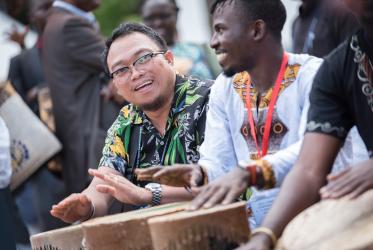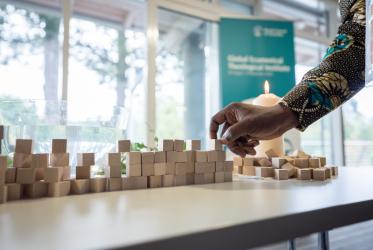In one of the most far-reaching theological curriculum reforms worldwide, the Senate of Serampore College in Madurai, India has developed a curriculum based on three pillars: contextual education, interdisciplinary dialogue and social relevance.
The new curriculum takes up major impulses and concerns of the World Council of Churches (WCC) project on Ecumenical Theological Education (ETE), such as an approach to theological education taking into account contextual, interdisciplinary aspects and the perspective of the marginalized. A gradual process of implementation of the new curriculum in theological colleges will start in June 2009.
At the forefront of this new curriculum is the Senate of Serampore College, which dates back to 1827 and is the oldest ecumenical organization in India. Since 1975 it has provided a national structure for theological education. With the affiliation of theological education institutions in Sri Lanka, Bangladesh and Nepal, the college developed into an international ecumenical body. Over the past 50 years, its membership has increased from 18 to more than 50 theological colleges.
In early February the Senate of Serampore College held what was probably one of the world's largest theological graduation ceremonies, with 1,241 theological students from its affiliated seminaries and colleges throughout India receiving their degrees and diplomas.
These graduates reflect a growing trend in registration for theological education courses in India. Registrations at Serampore-affiliated theological schools as a whole increased to 1,714 in 2008 from 1,596 in 2007. With this growing interest, institutional capacities need strengthening and more international support.
A mid-February consultation held in the south India city of Chennai by international ecumenical partners and theological education institutions in India discussed key elements of a master plan for theological education while exploring possibilities of closer cooperation. This cooperation is needed in particular to support weaker colleges in the northern and north eastern parts of the country.
According to Prof. Dr John Sadananda, president of the Senate of Serampore College, ecumenical theological education "is not merely an interdenominational collaboration of programmes", but an endeavour that "affirms life and healthy relationships of mutual acceptance and sharing", inspiring the "rebuilding of inclusive communities".
Communal tensions and violent attacks on churches and prayer venues in Orissa and Karnataka during the past months have posed a grave threat to the secular, democratic fabric of Indian society. The promotion of ecumenical theological education is seen as having crucial importance in this context. "The need of the hour is that all people of good will come together joining hands to defeat evil forces of fascism and fundamentalism," Sadananda said.
The WCC project on Ecumenical Theological Education develops and shares with theological educators and institutions curricula designed to prepare church leaders and pastors to engage ecumenically and theologically with difficult social issues like HIV/AIDS and disability.






